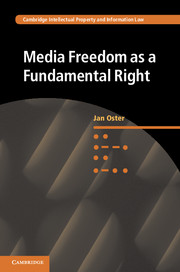Book contents
- Frontmatter
- Contents
- Preface and acknowledgements
- Table of cases
- Treaties, Conventions, Declarations and Statutes
- Reports and other documentary sources
- Introduction: aim, scope and method
- Part I The theoretical foundations of media freedom
- Part II General rules on media freedom
- Part III Specific limitations to media freedom
- Conclusion: tenets of a Media Freedom Principle
- Bibliography
- Index
- Cambridge Intellectual Property and Information Law
Conclusion: tenets of a Media Freedom Principle
Published online by Cambridge University Press: 05 June 2015
- Frontmatter
- Contents
- Preface and acknowledgements
- Table of cases
- Treaties, Conventions, Declarations and Statutes
- Reports and other documentary sources
- Introduction: aim, scope and method
- Part I The theoretical foundations of media freedom
- Part II General rules on media freedom
- Part III Specific limitations to media freedom
- Conclusion: tenets of a Media Freedom Principle
- Bibliography
- Index
- Cambridge Intellectual Property and Information Law
Summary
A Media Freedom Principle has to be conceptualised according to the following tenets:
1. Media freedom has to be recognised as a distinct fundamental right.
2. The rationale for media freedom is the significance of the media for rational public discourse.
3. ‘Public discourse’ is to be understood in a normative sense. It shall be defined as an open, free and argumentative communicative process aimed at reaching understanding and forming public opinion on matters of public concern. Public discourse shall be ‘open’ in the sense that it is non-exclusive. It shall be ‘free’ in that it is non-coercive. It shall be ‘argumentative’ in that the only authority is the authority of the better argument. It shall aim at reaching understanding, which is not the case if communication is based on intentional deception and insincerity. Finally, public discourse shall aim at the formation of public opinion on matters of public concern.
4. As a consequence, media freedom is, in the first place, an instrumental and functional right, rather than an inherent one. The media is protected for fulfilling a beneficial function for society in general.
5. ‘The media'should be defined in functional terms. ‘The media’ is any person or institution generating information and ideas on a journalistic basis and disseminating them via facilities of mass communication to an undefined number of recipients. Consequently, ‘the media’ as a legal concept:
(a) is a content provider rather than a mere speech intermediary;
(b) provides mass communication rather than individual communication; and
(c) is based on journalistic work, that is, the adherence of certain standards of conduct. However, ‘journalism'should in this con- text not be confused with a requirement of ‘professionalism’, but should be open to encompass non-professional writers, such as bloggers, who regularly contribute to the public discourse.
- Type
- Chapter
- Information
- Media Freedom as a Fundamental Right , pp. 268 - 270Publisher: Cambridge University PressPrint publication year: 2015



